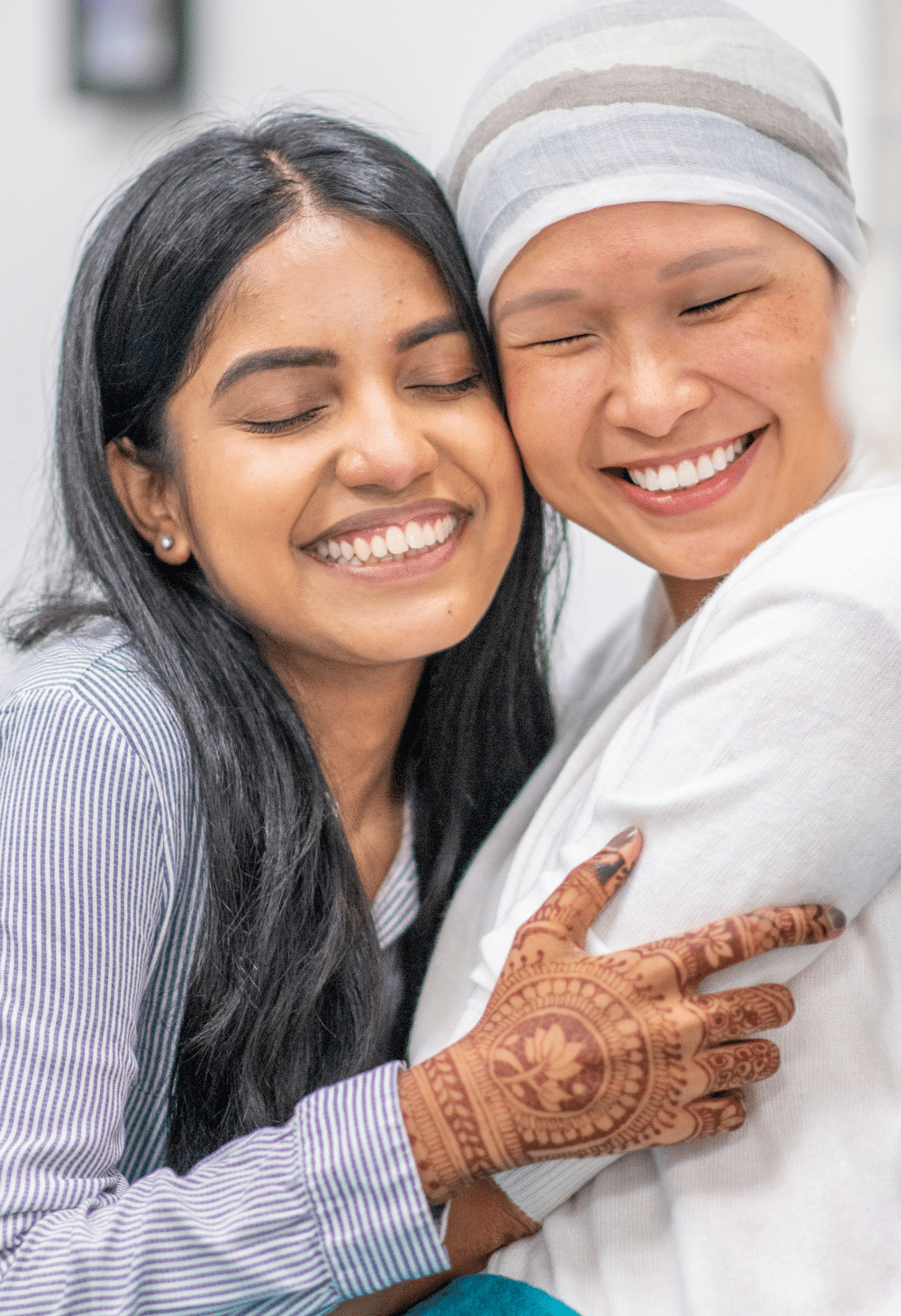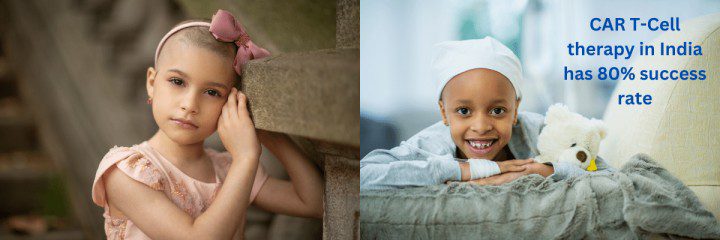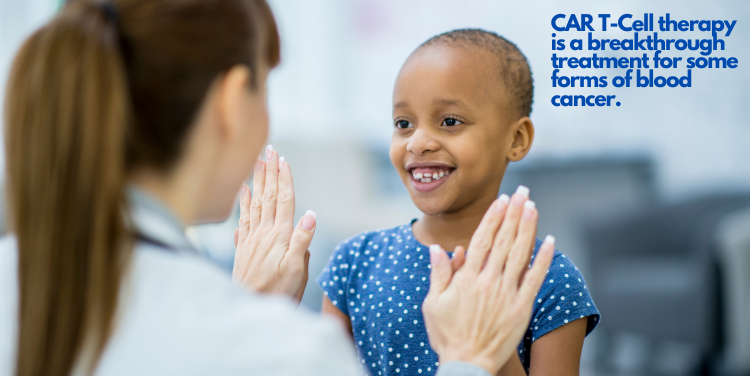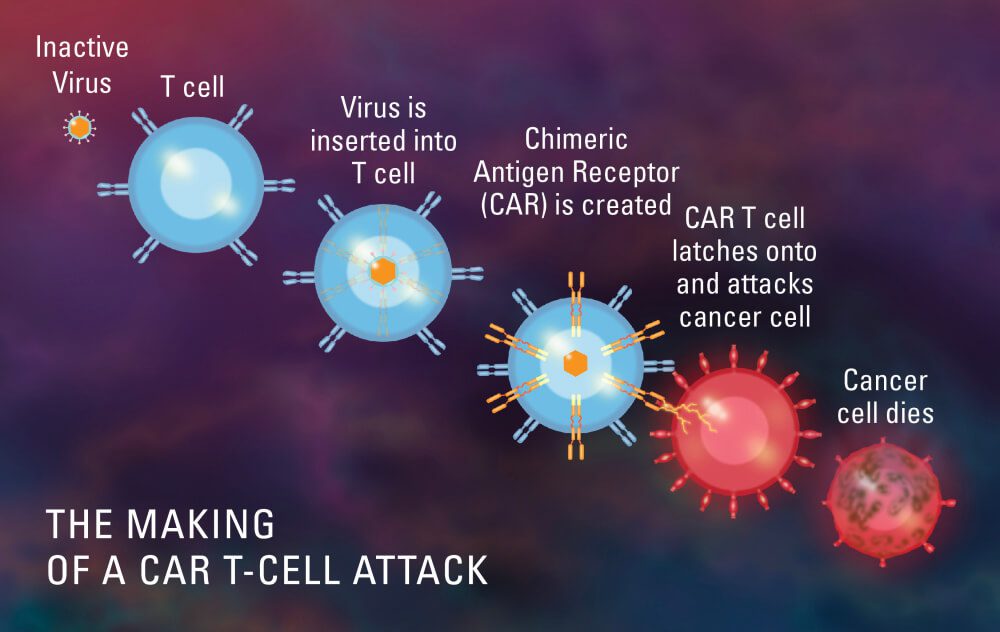
CAR T-Cell Therapy in India
In October 2023, the Central Drugs Standard Control Organization (CDSCO), which is India’s equivalent of the US Food and Drug Administration, granted approval to NexCAR19, making it the first CAR-T cell therapy to be licensed in India. CAR T cell therapy in India has been officially launched in 6 hospitals across Delhi, Mumbai, and Pune.
In the past few years, Indian hospitals and study centres have come a long way towards using CAR T-cell therapy. CAR T-cell therapy could change the way cancer is treated, so it gives patients who don’t have many other choices new hope. In this new treatment, the patient’s own immune cells are reprogrammed to find and kill cancer cells.
CAR T-Cell Therapy In India – Current Status
April, 2025: Chimeric Antigen Receptor (CAR) T-cell therapy is an innovative cancer treatment, particularly useful for hematologic malignancies such as leukemia and lymphoma. In India, the therapy has been picking up pace with more and more research, clinical trials, and regulatory intervention.

As of 2025, India saw a remarkable spur in CAR T-cell therapy, with several academicians as well as private firms developing indigenous solutions. The Indian Institute of Technology (IIT) Bombay, along with Tata Memorial Hospital, has taken the lead to create India’s first indigenous CAR T-cell therapy. The therapy, NexCAR19, got the approval of the Central Drugs Standard Control Organization (CDSCO) for the treatment of relapsed or refractory B-cell malignancies, which is a significant achievement.
Several cancer centers are currently involved in clinical trials to increase access to CAR T therapy. At the same time, biotech companies are investing in establishing infrastructure, such as GMP-grade CAR T-cell manufacturing facilities and infusion centers, nationwide. While the therapy is still expensive, continued localization efforts aim to make it more accessible and affordable.

The future of CAR T-cell therapy in India holds much promise, fueled by innovation, government encouragement, and increasing expertise, providing hope to cancer patients whose cancers were once untreatable.
At present, this life-saving therapy is available in the USA, UK, Canada, Israel, Singapore, China, Malaysia, & Australia. The cost of this therapy is around $500,000 to $700,000 USD in the USA, whereas in China it costs anywhere between $70,000 and $80,000 USD.
Top Hospitals for CAR T-Cell therapy in India
You can find CAR T-Cell therapy in several prominent Indian medical healthcare centers, such as Tata Memorial Centre, Apollo Cancer Hospital, BLK, Artemis, Asian Oncology, American Oncology, and HCG.
The availability of CAR T Cell Therapy in these prestigious healthcare facilities is a huge step in India’s fight against cancer. Find out the top 5 hospitals known for providing the best CAR-T treatment in India.
Tata Memorial Cancer Hospital In Mumbai
Among the leading providers of CAR T treatment in India, first comes Tata Memorial Hospital, which is a world-class provider of cancer treatment. In this hospital, a team of experienced doctors and researchers works hard to fight cancer using advanced treatments. The hospital is known for its excellence in cancer care and has a lot of experience in using CAR T cell therapy to help patients get better. People come here from all over because they trust Tata Memorial to give them the best chance at beating cancer. So, if you or someone you know needs excellent cancer care, Tata Memorial Cancer Hospital is a great choice.
Apollo Cancer Institute In Chennai
The Apollo Cancer Institute in Chennai is a well-known healthcare center known for its excellent cancer treatment services. They provide comprehensive care to cancer patients through advanced technology and a highly experienced team of oncologists. Their dedicated team of oncologists, surgeons, and support staff work tirelessly to create personalized treatment plans that prioritize both effectiveness and the patient’s quality of life. Their commitment to excellence has earned them a respected reputation in the field of cancer care.
National Cancer Institute (AIIMS) In Delhi
The National Cancer Institute (AIIMS) in Delhi is another leading institution for CAR-T cell therapies. You can get access to CAR-T therapy here at the most affordable cost. This medical institute is well known for its advanced research on immuno-adoptive cell therapy, top-notch facilities, and highly skilled doctors. The center takes a team approach, bringing together experienced oncologists, surgeons, radiologists, and support staff to create personalized treatment plans for blood cancer and all other types of cancer. They even use advanced technology like artificial intelligence and genetic analysis to provide the best cancer care to patients.
BLK Max Cancer Center, Delhi
The BLK Max Cancer Centre in Delhi is one of India’s leading cancer hospitals, dedicated to providing chimeric antigen receptor T cell therapy (CAR T). Their institute has advanced technology for cancer care, which includes robotic surgery, tomotherapy, and immunotherapy. Their warm and supportive environment can help you stay strong and combat the disease.
Rajiv Gandhi Cancer Institute & Research Centre In Delhi
The Rajiv Gandhi Cancer Institute & Research Centre in Delhi is one of Asia’s leading cancer centers. Their innovative technology and talented staff offer world-class cancer care for patients in India, as well as in SAARC nations. The institute has had the honor of positively influencing the lives of approximately 2.75 lakh cancer patients since its foundation in 1996. Their specialist offers the best possible care to cancer patients through cost-effective CAR T Cell therapy in India.
Top doctor’s for CAR T Cell therapy in India
Learn about the top oncologists for CAR T Treatment In India. These experienced doctors are committed to providing the best cell therapy for cancer along with personalized care and support. Trust in their expertise for a brighter future in your fight against cancer!
Dr T Raja (MD, DM)
Dr. T Raja is a well-known Medical Oncologist with over 25 years of experience in cancer treatment. He is well-known for his outstanding knowledge and is regarded as one of India’s top oncologists. Dr. Raja also holds a prominent academic position, leading the DNB Medical Oncology program at Apollo Specialty Hospital in Chennai. He is a sought-after speaker at national and international conferences, where he shares his valuable insights.
Dr Srikanth M (MD, DM)
Dr. Srikanth M. is a highly experienced hematologist in Chennai, known for his expertise in treating various blood-related conditions. He specializes in both short-term and long-term health issues like anemia, myeloma, b-cell lymphomas and leukaemia. Dr. Srikanth M. also provides advanced tests to check your overall health, such as bone marrow aspiration and chelation therapy for rare cases like an excess of minerals in the blood. Dr. Srikanth M. has received awards for his contributions to myeloma research, making him a trusted specialist in hematology ready to provide specialized care to patients in need.
Dr Revathi Raj (MD, DCH)
Dr. Revathi Raj is a highly respected specialist known for her expertise in pediatric bone marrow transplants. She has successfully conducted over 2000 of these transplants, making her India’s leading expert. Dr. Raj has extensive experience treating children with blood abnormalities such as thalassemia, hemophilia, sickle cell anemia, aplastic anemia, and leukemia. She is highly committed to the well-being of children, running a specialized service for pediatric leukemia and lymphoma with an 80% cure rate.
Cost Of Car T-Cell Therapy In India
On October 13, 2023, a company named Immunoadoptive Cell Therapy Private Limited (ImmunoACT) in Mumbai received permission from the Central Drugs Standard Control Organisation (CDSCO) for India’s first special cancer treatment called NexCAR19.
This treatment is specially designed to help people with certain types of leukemia and lymphoma who haven’t responded to other treatments. The clinical trial of this process was conducted on 60 patients with lymphomas and leukamia. The overall response rate of this pivotal clinical trial was 70% which marked it as a successful therapy to destroy cancer cells more effectively.
The cost of CAR T cell therapy in India is approximately USD 57,000. This price is much lower when compared to countries like the USA, Singapore, Malaysia etc. However, it’s crucial to note that this pricing can vary depending on a variety of factors. The CAR-T cell therapy costs might differ from one hospital to another depending on their technology, expertise, and other facilities.
Furthermore, the type of CAR T-cell therapy required and the condition of the patient may also affect the overall cost.
What Is Car T-Cell Therapy?

Chimeric antigen receptor T-cell therapy, often known as CAR T-cell therapy, is a groundbreaking immunotherapy that has entirely changed the way that cancer is treated. It gives patients with certain cancers hope that was previously considered incurable or with few therapeutic alternatives.
The treatment entails using a patient’s own immune cells—more specifically, T cells—and lab-modifying them to improve their capacity to detect and destroy cancer cells. To do this, the T cells are given a chimeric antigen receptor (CAR), which gives them the ability to target particular proteins, or antigens, on the surface of cancer cells.
T cells from the patient are first removed, and they are then genetically modified to express the CAR. In the laboratory, these altered cells are multiplied to produce a sizable population of CAR T cells, which are then put back into the patient’s bloodstream.
As soon as they are inside the body, CAR T cells find cancer cells that express the desired antigen, attach to them, and trigger a potent immune response. The CAR T cells that have been activated proliferate and conduct a focused attack on the cancer cells, killing them.
When used to treat some blood malignancies like acute lymphoblastic leukaemia (ALL) and specific forms of lymphoma, CAR T-cell therapy has shown exceptional results. It has produced notable response rates and, in some patients, even long-lasting remissions.
CAR T-cell therapy, however, is a sophisticated and unique therapeutic method that might have risks and adverse effects. Certain people may experience cytokine release syndrome (CRS), a widespread immunological reaction that can result in flu-like symptoms and, in extreme situations, organ failure. There have also been reports of neurological adverse effects; however, they are frequently curable.
Despite these difficulties, CAR T-cell therapy is a significant advancement in the fight against cancer and shows great potential for the future. Current studies are focused on enhancing its efficacy and safety profile as well as extending its uses to different cancer types. CAR T-cell therapy has the ability to change the face of cancer treatment and give patients everywhere new hope with further advancements.
Procedure
The CAR-T therapy procedure, which takes a few weeks, involves multiple steps:
T cells are extracted from your blood using a tube that is placed into an arm vein. This takes a couple of hours.
T cells are transported to a facility where they undergo genetic modification to become CAR-T cells. Two to three weeks pass throughout this.
CAR-T cells are reintroduced into your bloodstream through a drip. This requires several hours.
CAR-T cells target and eliminate cancer cells throughout the body. After receiving CAR-T therapy, you will be closely watched.
What Type of Cancer Cells Can Be Treated With Car-T Cell Therapy?
Only patients with adult B-cell non-lymphoma Hodgkin’s or pediatric acute lymphoblastic leukemia who have already tried two unsuccessful conventional therapies can currently use CAR T-cell therapy products that have received FDA approval. However, CAR T-cell therapy is now being tested in clinical studies as a first or second-line treatment for adult lymphoma and pediatric acute lymphoblastic leukemia. Recently, some of the studies have shown remarkable successes in cases of solid tumors too, like glioblastoma, gliomas, liver cancer, lung cancer, GI cancer, pancreatic cancer, and oral cancer.
What Are The Advantages Of Car-T Cell Therapy?
The main benefit is that CAR T-cell therapy only requires a single infusion and often only requires two weeks of inpatient care. Patients with non-Hodgkin lymphoma and pediatric leukemia who have just been diagnosed, on the other hand, typically need chemotherapy for at least six months or more.
The advantages of CAR T-cell therapy, which is actually a living medication, can persist for many years. If and when a relapse occurs, the cells will still be able to identify and target cancer cells because they can survive in the body for an extended period of time.
Although the information is still developing, 42% of adult lymphoma patients who underwent CD19 CAR T-cell treatment were still in remission after 15 months. And after six months, two-thirds of patients with pediatric acute lymphoblastic leukemia were still in remission. Unfortunately, these patients had exceedingly aggressive tumors that weren’t successfully treated using traditional standards of care.
What type of patients would be good recipients of the CAR-T Cell Therapy?
Patients between the age of 3 Years to 70 Years have been tried with CAR T-Cell therapy for different type of blood cancers and has been found to be very effective. Many centers have claimed success rates of more than 80%. The optimum candidate for CAR T-cell therapy at this time is a juvenile with acute lymphoblastic leukemia or an adult with severe B-cell lymphoma who has already had two lines of ineffective therapy.
Before the end of 2017, there was no accepted standard of care for patients who had already gone through two lines of therapy without experiencing remission. The only FDA-approved treatment that has so far proven to be significantly beneficial for these patients is CAR T-cell therapy.
How Effective Is Car-T Cell Therapy?
CAR T-cell therapy has been very effective in treating some types of blood cancer, like acute lymphoblastic leukaemia (ALL) and non-Hodgkin lymphoma. In clinical trials, the response rates have been very good, and a lot of patients have gone into full remission. In some cases, people who had tried every other medicine had long-lasting remissions or even possible cures.
One of the best things about CAR T-cell treatment is that it targets the right cells. The CAR receptors that have been added to the T cells can find specific marks on cancer cells. This makes it possible to give targeted treatment. This targeted method hurts healthy cells as little as possible and lowers the risk of side effects that come with traditional treatments like chemotherapy.
But it’s important to keep in mind that CAR T-cell therapy is still a new area that is still changing. Researchers and doctors are working hard to solve problems like the high cost, the possibility of serious side effects, and the fact that it only works for some types of cancer.
In the end, CAR T-cell therapy has shown to be a very successful way to treat some types of blood cancer. Even though it is a promising and powerful method, more study and clinical trials are needed to improve it and find new ways to use it. CAR T-cell therapy could change how cancer is treated and make things better for people all over the world if it keeps getting better.
Inclusion & Exclusion Criteria
Inclusion Criteria For CAR T-Cell Therapy:
1. Patients with CD19+ B-cell Lymphoma(At least 2 prior combination chemotherapy regimens)
2. To be aged 3 to 75 years
3. ECOG score ≤2
4. Women of childbearing potential must have a urine pregnancy test taken and proven negative prior to the treatment. All patients agree to use reliable methods of contraception during the trial period and until follow-up for the last time.
Exclusion Criteria For CAR T-Cell Therapy:
1. Intracranial hypertension or unconsciousness
2. Respiratory failure
3. Disseminated intravascular coagulation
4. Hematosepsis or Uncontrolled active infection
5. Uncontrolled diabetes.
What Are The Side Effects Of Car-T Cell Therapy?
Below mentioned are some of the side-effects of CAR T-Cell therapy.
- Cytokine release syndrome (CRS): The most prevalent and possibly significant side effect of CAR T-cell treatment is cytokine release syndrome (CRS). The flu-like symptoms, including fever, exhaustion, headaches, and muscle pain, are brought on by the modified T cells’ production of cytokines. In extreme circumstances, CRS may result in a high temperature, hypotension, organ failure, and even potentially fatal consequences.
- Neurological Toxicity: Some patients may develop neurological side effects, which can range in severity from less serious signs like mild confusion and disorientation to more serious ones like seizures, delirium, and encephalopathy. After CAR T-cell infusion, neurological toxicity frequently happens during the first week.
- Cytopenias: CAR T-cell treatment can result in low blood cell counts, such as anaemia (low red blood cell count), neutropenia (low white blood cell count), and thrombocytopenia (low platelet count). Infections, bleeding, and exhaustion are among risks that can be exacerbated by these cytopenias.
- Infections: The CAR T-cell therapy’s suppression of healthy immune cells increases the risk of bacterial, viral, and fungal infections. In order to prevent infections, patients may need to be closely watched and given preventive medication.
- Tumour Lysis Syndrome (TLS): After CAR T-cell therapy, it’s possible in some circumstances for substantial amounts of cell contents to be released into the bloodstream due to the rapid killing of tumour cells. This may result in metabolic abnormalities, such as excessive potassium, uric acid, and phosphate levels, which may damage the kidneys and cause other problems.
- Hypogammaglobulinemia: CAR T-cell treatment has the potential to decrease antibody synthesis, which could result in hypogammaglobulinemia. This might make recurrent infections more likely and call for continuing antibody replacement medication.
- Organ Toxicity: CAR T-cell therapy has the potential to harm a number of organs, including the heart, lungs, liver, and kidneys. This may lead to abnormal renal function tests, respiratory issues, heart issues, and abnormal liver function tests.
- Hemophagocytic lymphohistiocytosis (HLH): A rare but possibly fatal immunological disease called hemophagocytic lymphohistiocytosis (HLH) can develop as a result of CAR T-cell therapy. It involves the overactivation of immune cells, which causes serious organ damage and inflammation.
- Hypotension and Fluid Retention: As a result of the cytokines that CAR T cells release, some patients may develop low blood pressure (hypotension) and fluid retention. To address these symptoms, supportive measures including intravenous fluids and drugs could be required.
- Secondary Malignancies: Reports of secondary malignancies emerging following CAR T-cell therapy exist, notwithstanding their rarity. Research is currently being done on the potential for secondary malignancies and long-term hazards.
It’s important to remember that not every patient will have these side effects, and that each person’s level of sensitivity will differ. In order to minimize and minimize these potential adverse effects, the medical team closely examines patients before, during, and after CAR T-cell therapy.
Time Frame
Check below the total time frame required for complete the CAR T-Cell therapy process. Although time frame depends a lot on the distance of lab from the hospital that prepared the CAR’s.
- Examination & test: one week
- Pre-treatment & T-Cell Collection: one week
- T-Cell preparation & return: two-three weeks
- 1st Effectiveness analysis: three weeks
- 2nd Effectiveness analysis: three weeks.
Total time frame: 10-12 Weeks
Process Of Getting CAR T Cell Therapy In India
Send Your Reports
Share your medical history, including recent blood reports, biopsy results, and PET scans, with us at info@cancerfax.com. This crucial step allows us to assess your condition and guide you towards the most suitable treatment.
Evaluation & Opinion
Our team of experts will carefully review your reports to provide a thorough evaluation and expert opinion. This helps us determine the best course of action and recommend the most suitable hospitals and specialists for your CAR T Cell therapy as per your budget.
Medical Visa And Travel
We will help you in obtaining a medical visa and will plan your travel arrangements. Our objective is to make your trip as easy as possible so you can focus on your treatment and recovery.
Treatment And Follow Up
Once you arrive at the hospital of your choice, our devoted team will continue to help you throughout the treatment process. We promote seamless communication between you and the medical staff, ensuring you receive the best possible treatment. Your well-being remains our top priority.
FAQs On Car T-Cell Therapy In India
What is CAR T-cell therapy?
- CAR T-cell therapy is a type of immunotherapy that involves modifying a patient’s own T cells to recognize and attack cancer cells. This personalized treatment has shown promising results in certain types of cancer.
Is CAR T-cell therapy available in India?
- Yes, CAR T-cell therapy is available in India at some specialized cancer centers. However, its availability may vary, and it might be limited to certain types of cancers.
Which cancers can be treated with CAR T-cell therapy in India?
- As of my last update, CAR T-cell therapy was primarily used to treat certain types of blood cancers, such as leukemia and lymphoma. The specific cancers eligible for treatment may depend on the protocols followed by individual healthcare institutions.
What is the cost of CAR T-cell therapy in India?
- The cost of CAR T-cell therapy can be high. It may include the cost of collecting and modifying the patient’s T cells, the laboratory procedures, and the administration of the therapy. The cost can vary based on the type of cancer being treated and the healthcare facility.
Are there any side effects of CAR T-cell therapy?
- Yes, like any medical treatment, CAR T-cell therapy can have side effects. Common side effects include cytokine release syndrome (CRS) and neurologic toxicities. The severity of side effects can vary among individuals.
How successful is CAR T-cell therapy in treating cancer?
- CAR T-cell therapy has shown remarkable success in treating certain types of cancer, particularly blood cancers. However, its effectiveness can vary depending on the type and stage of cancer, as well as individual patient factors.
Is CAR T-cell therapy covered by insurance in India?
- Coverage by insurance may vary. It’s essential to check with the insurance provider and the healthcare facility offering the treatment to understand the coverage options.
How can I access CAR T-cell therapy in India?
- Patients interested in CAR T-cell therapy should consult with oncologists and healthcare providers who specialize in this treatment. They can guide patients through the evaluation process and determine eligibility.